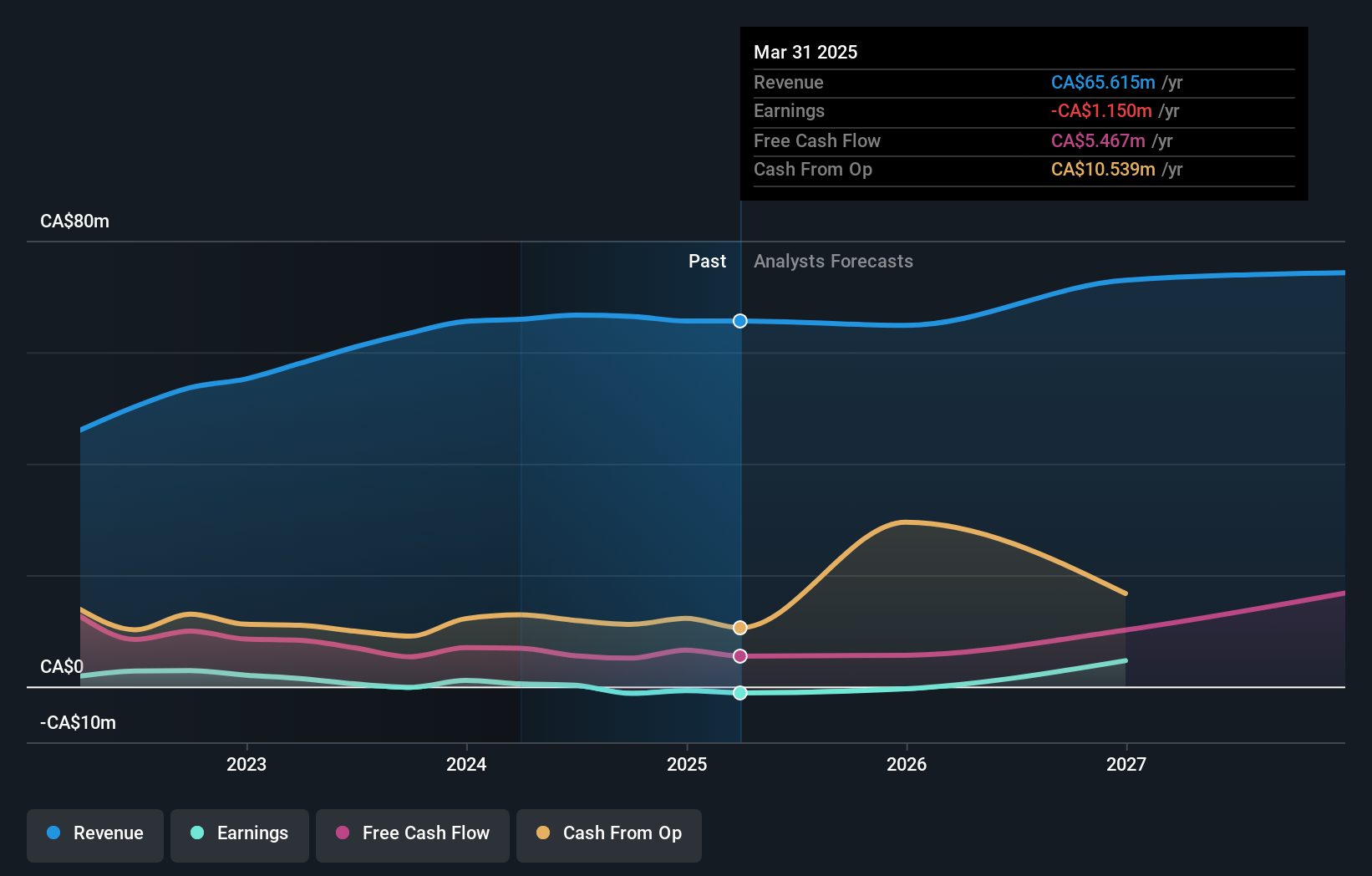Both retail investors who control a good portion of Sylogist Ltd. (TSE:SYZ) along with institutions must be dismayed after last week's 14% decrease
Key Insights
- Sylogist's significant retail investors ownership suggests that the key decisions are influenced by shareholders from the larger public
- The top 24 shareholders own 42% of the company
- Institutional ownership in Sylogist is 38%
A look at the shareholders of Sylogist Ltd. (TSE:SYZ) can tell us which group is most powerful. With 58% stake, retail investors possess the maximum shares in the company. In other words, the group stands to gain the most (or lose the most) from their investment into the company.
Following a 14% decrease in the stock price last week, retail investors suffered the most losses, but institutions who own 38% stock also took a hit.
Let's take a closer look to see what the different types of shareholders can tell us about Sylogist.
View our latest analysis for Sylogist

What Does The Institutional Ownership Tell Us About Sylogist?
Many institutions measure their performance against an index that approximates the local market. So they usually pay more attention to companies that are included in major indices.
Sylogist already has institutions on the share registry. Indeed, they own a respectable stake in the company. This implies the analysts working for those institutions have looked at the stock and they like it. But just like anyone else, they could be wrong. It is not uncommon to see a big share price drop if two large institutional investors try to sell out of a stock at the same time. So it is worth checking the past earnings trajectory of Sylogist, (below). Of course, keep in mind that there are other factors to consider, too.

Hedge funds don't have many shares in Sylogist. The company's largest shareholder is PenderFund Capital Management Ltd., with ownership of 13%. With 11% and 4.1% of the shares outstanding respectively, Seymour Investment Management Ltd. and Punch & Associates Investment Management, Inc. are the second and third largest shareholders.
Our studies suggest that the top 24 shareholders collectively control less than half of the company's shares, meaning that the company's shares are widely disseminated and there is no dominant shareholder.
While studying institutional ownership for a company can add value to your research, it is also a good practice to research analyst recommendations to get a deeper understand of a stock's expected performance. There are plenty of analysts covering the stock, so it might be worth seeing what they are forecasting, too.
Insider Ownership Of Sylogist
The definition of company insiders can be subjective and does vary between jurisdictions. Our data reflects individual insiders, capturing board members at the very least. The company management answer to the board and the latter should represent the interests of shareholders. Notably, sometimes top-level managers are on the board themselves.
I generally consider insider ownership to be a good thing. However, on some occasions it makes it more difficult for other shareholders to hold the board accountable for decisions.
Shareholders would probably be interested to learn that insiders own shares in Sylogist Ltd.. In their own names, insiders own CA$7.7m worth of stock in the CA$214m company. It is good to see some investment by insiders, but we usually like to see higher insider holdings. It might be worth checking if those insiders have been buying.
General Public Ownership
The general public, who are usually individual investors, hold a substantial 58% stake in Sylogist, suggesting it is a fairly popular stock. This size of ownership gives investors from the general public some collective power. They can and probably do influence decisions on executive compensation, dividend policies and proposed business acquisitions.
Next Steps:
While it is well worth considering the different groups that own a company, there are other factors that are even more important.
I like to dive deeper into how a company has performed in the past. You can find historic revenue and earnings in this detailed graph.
If you would prefer discover what analysts are predicting in terms of future growth, do not miss this free report on analyst forecasts.
NB: Figures in this article are calculated using data from the last twelve months, which refer to the 12-month period ending on the last date of the month the financial statement is dated. This may not be consistent with full year annual report figures.
New: Manage All Your Stock Portfolios in One Place
We've created the ultimate portfolio companion for stock investors, and it's free.
• Connect an unlimited number of Portfolios and see your total in one currency
• Be alerted to new Warning Signs or Risks via email or mobile
• Track the Fair Value of your stocks
Have feedback on this article? Concerned about the content? Get in touch with us directly. Alternatively, email editorial-team (at) simplywallst.com.
This article by Simply Wall St is general in nature. We provide commentary based on historical data and analyst forecasts only using an unbiased methodology and our articles are not intended to be financial advice. It does not constitute a recommendation to buy or sell any stock, and does not take account of your objectives, or your financial situation. We aim to bring you long-term focused analysis driven by fundamental data. Note that our analysis may not factor in the latest price-sensitive company announcements or qualitative material. Simply Wall St has no position in any stocks mentioned.
About TSX:SYZ
Sylogist
A software company, provides mission-critical software-as-a-service solutions to public sector customers in Canada, the United States, the United Kingdom, and internationally.
Undervalued with mediocre balance sheet.
Similar Companies
Market Insights
Community Narratives




